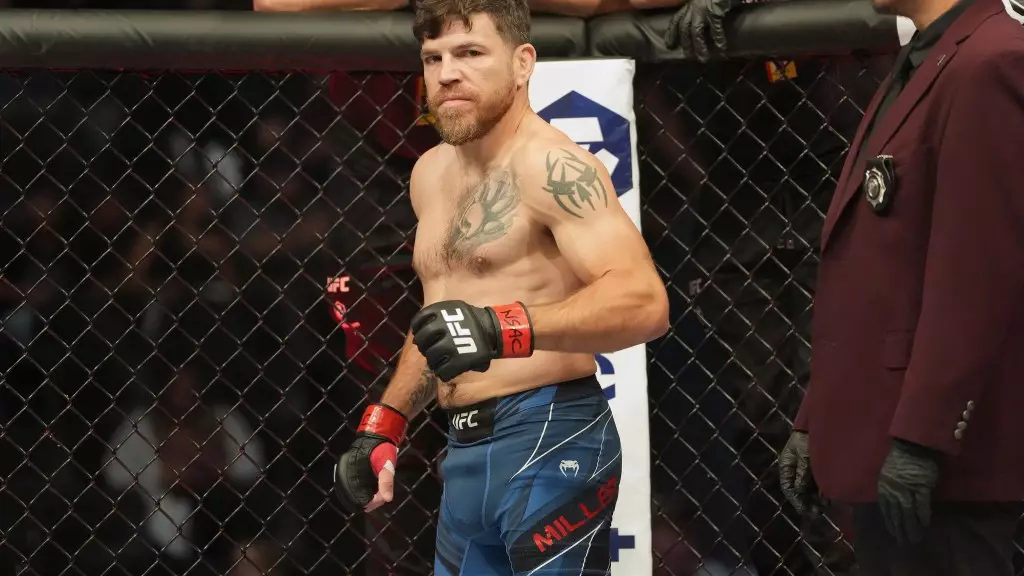Jim Miller, a name synonymous with the Ultimate Fighting Championship (UFC), stands as a figure of endurance and resilience in a sport defined by constant evolution and fierce competition. Despite an impressive record and numerous accolades, including being the UFC record-holder for both the most fights and wins, Miller has often grappled with an unexpected and profound sense of self-doubt known as imposter syndrome. Such sentiments might appear incongruous to the casual observer, especially when one considers Miller’s remarkable achievements in the octagon.
Imposter Syndrome: A Fighter’s Hidden Struggle
Imposter syndrome is a psychological pattern where an individual doubts their accomplishments and has a persistent fear of being exposed as a “fraud.” For a seasoned fighter like Miller, whose career spans nearly two decades and includes participation in milestone events like UFC 100, 200, and 300, it may seem startling that he experiences such self-doubt. When speaking candidly about his feelings, Miller remarked on his reluctance to make demands about his career or call out opponents, asserting that his primary focus should remain on fighting, not on promotional negotiations or strategic maneuvers.
This hesitance is not a sign of weakness; rather, it reflects a deeper understanding of his role within the sport. Miller perceives himself as a fighter first, often shying away from the self-promotion that many of his peers embrace. This unique perspective, however, raises questions about the cultural expectations of fighters within MMA and how those expectations shape the conduct and self-perception of even the most accomplished athletes.
What’s particularly compelling about Jim Miller’s career is not just his record but the respect he has garnered from peers, matchmakers, and fans alike. Over the years, Miller has built relationships with figures like Sean Shelby and Joe Rogan, which have further solidified his standing in the UFC community. While he acknowledges the respect he’s earned, he remains grounded, recognizing the importance of humility in an arena that often values bravado and showmanship.
Miller’s approach to negotiation and fight selection is emblematic of a bygone era of fighters who were less inclined to engage in theatrics and more focused on the craft of fighting. Though he possesses the credentials to make hefty demands, such as fighting exclusively on prominent pay-per-view cards, Miller grapples with the discomfort of asserting himself. This internal conflict illustrates the dichotomy between his impressive resume and his personal ethos, raising broader questions about the dynamics of fighter representation and the pressures athletes face in positioning themselves within the industry.
As Miller reflects on his career, it’s essential to recognize how he has adapted to the changing landscape of UFC over the years. With each passing year, he has continued to compete at a high level, proving his resolve and fighting spirit. In 2024, for instance, he fought three times, showcasing not only his endurance but also his willingness to embrace the challenge of competing against an ever-evolving roster of younger fighters.
Despite the challenges posed by age and a demanding schedule, Miller’s ability to engage in fights that resonate with both the audience and his desire for personal growth illustrates the essence of a true martial artist. His mixed martial arts journey—characterized by sacrifices, triumphs, and occasional disappointments—speaks to a larger narrative about perseverance in the face of adversity.
Jim Miller’s narrative transcends mere statistics; it embodies the spirit of what it means to be a professional fighter in the modern era. His experience highlights the complexities of self-identity, respect, and the inherent struggles athletes face, illuminating a path that is not just about victories in the octagon but also about establishing a legacy built on humility, respect, and dedication to the sport. As he continues to navigate his career, one can only anticipate how his story will develop and resonate with both current and future generations of fighters who aspire to carve out their own legacies in the demanding world of mixed martial arts.

